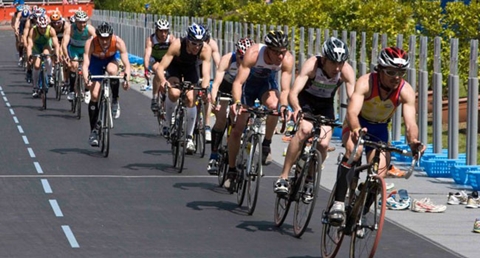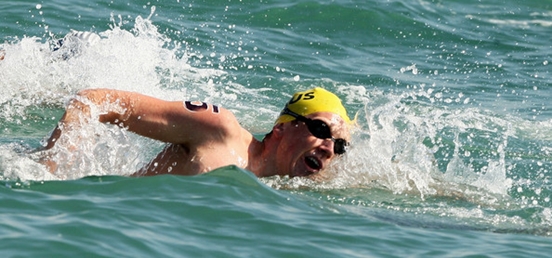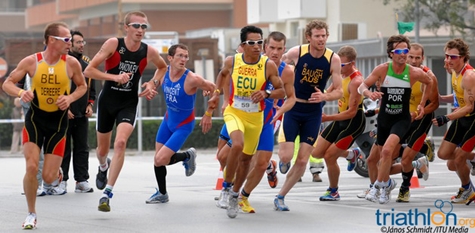Anxiety can Diminish Swim Performance and Create Health Problems
For many athletes, the swim portion of a triathlon, especially the mass swim start of the Ironman triathlon distance, and open water swimming in general causes anxiety and even panic attacks. Anxiety may result from inexperience in open water swimming, crowds, overheating in a wetsuit, inhaling water, being kicked, rough water, turns, poor visibility, general race start anxiety, sun in eyes limiting visibility, or difficulty navigating a straight course.
Anxiety causes an increase in pulse rate and blood pressure which can interfere with and diminish swimming performance. Anxiety begets anxiety, increasing the pulse rate even further. This anxiety and racing pulse rate stresses the cardiovascular system and can contribute to cardiac arrest. Although distance triathlon and marathon race promoters do not like to publicize it, the risks of cardiac arrest increase during distance triathlons and marathons. For example, 3 runners died of a heart attack during a recent Detroit Marathon and an athlete died from a heart attack suffered during the 2012 Ironman Coeur d'Alene swim. For this reason, it's a good idea to be familiar with the latest thinking on CPR skills. See Cardiopulmonary Resuscitation (CPR) is a Life Skill: Learn How to do it!. The life you save may be your training buddy!
The purpose of the article is to offer some useful tips to help you prevent and manage anxiety during the swim for better race performance and health. A taxing swim will impact your performance on the bike and run.
Tips to Manage Race Day Anxiety
1. Know Your Resting Pulse Rate. Swimming is 75% technique. Swimming also is an exercise in breathing composure. The ability to be relaxed in your breathing while swimming relaxes your cardiovascular system which helps keep down your pulse rate and enables strong, smooth enduring swims. Become familiar with and in tune with your resting pulse rate as an indicator of general health, overtraining and anxiety. On race day, a higher than normal resting pulse rate will cause you to reach too high a pulse rate with less exertion, diminishing performance. A higher the normal resting pulse rate at swim start increases the risk of some event during the swim increasing your anxiety, further increasing your pulse rate. See Breathing Rhythm and Health. Also see Resting Heart Rate as a Measure of Health
2. Come to the Race Relaxed. You have control over whether you arrive at the race relaxed. Here are some common occurances which will increase your resting pulse rate increasing your chances of anxiety during the race.
• Overtraining. If you did not taper properly for the race, you may not be rested sufficiently. Knowing your resting pulse rate is an easy way to test whether you have sufficiently rested for race day. If your resting pulse race is too high the morning before race day, you may not be sufficiently rested.
• Travel, especially air travel. Travel in general takes us out of our regular routine, sometimes interfering with sleep, interfering with a relaxed state. Air travel in particular can be very disruptive because the airplane air is generally very dry and dehydrating. Dehydration will increase your resting pulse rate. It generally known within the medical community that air travel, especially long distance air travel increases the risks of accident and cardiac arrest, this is due in part to being unfamiliar with your surroundings, out of your routine, lack of sufficient rest and sleep, increased stress of travel, all contributing to increasing your resting pulse rate.
• Eating well while traveling? It's often difficult to eat well when traveling. Fast food, which is mostly high in both sodium and high fructose corn syrup, will increase your resting pulse rate, as both sodium and high fructose corn syrup act as a form of speed, increasing normal metabolism sapping you of energy.
• Are race venue weather conditions differnet from home? If race venue weather conditions are either hotter, more humid or more dry than what your home and training weather, you will need to be sensitive to maintaining good hydration and electrolyte balance. Dehydration will cause your resting pulse rate to increase. See Hydration and Electrolytes - Impact on Athletic Performance. Also see Natural Food Sources of Potassium
3. Remain emotionally balanced during the swim. The swim start and the swim is a challenge. The unexpected can and will happen. Just like other life challenges, the swim challenge can be accomplished and mastered by keeping a cool head under pressure. A good strategy is to learn to enjoy the challenge and the moment. The swim is unique and can be a lot of fun. Maintaining your breathing composure during the swim will help you maintain emotional balance and keep a cool head for a successful swim!
4. Learn to comfortably breath every 4th or 5th stroke sometimes. Breathing comfortably every 4th or 5th stroke is accomplished by exhaling slowly during the 4 or 5 stroke cycle, then taking a quick but deep inhale. This is good to practice in your pool workouts. Try alternating breathing every 4th or 5th stroke with your normal breathing every 2nd or 3rd stroke. It takes a bit of practice, but developing this breathing skill is valuable. This breathing technique (i) builds aerobic capacity, (ii) is relaxing, (iii) tends to slightly reduce your pulse rate, and (iv) is great to use during the beginning of the mass swim start - the 'washing machine' - when the water all around you is churning.
5. When racing in warm water. If the race water temperature is warm, but wetsuit legal, be sensitive to overheating in a full wetsuit, particularly over an Ironman swim distance. Overheating will increase your pulse rate and make for a very uncomfortable and possibly unhealthy swim. In 2010, world class swimmer Fran Crippen, 26, died of a heat stroke induced heart attack near the end of the 10-kilometer race off the shore of the United Arab Emirates. High water temperatures were attributed to his death, with several swimmers complaining of dehydration and disorientation.
6. Simulate the race environment. If possible, train in open water in a group to become familiar with the open water swimming environment.
More about Ralph Teller. See Ralph's 1Vigor Log Calendar.







